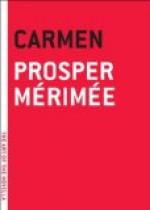“For a good hour I lay there prostrate beside her corpse. Then I recollected that Carmen had often told me that she would like to lie buried in a wood. I dug a grave for her with my knife and laid her in it. I hunted about a long time for her ring, and I found it at last. I put it into the grave beside her, with a little cross—perhaps I did wrong. Then I got upon my horse, galloped to Cordova, and gave myself up at the nearest guard-room. I told them I had killed Carmen, but I would not tell them where her body was. That hermit was a holy man! He prayed for her—he said a mass for her soul. Poor child! It’s the calle who are to blame for having brought her up as they did.”
CHAPTER IV
Spain is one of the countries in which those nomads, scattered all over Europe, and known as Bohemians, Gitanas, Gipsies, Ziegeuner, and so forth, are now to be found in the greatest numbers. Most of these people live, or rather wander hither and thither, in the southern and eastern provinces of Spain, in Andalusia, and Estramadura, in the kingdom of Murcia. There are a great many of them in Catalonia. These last frequently cross over into France and are to be seen at all our southern fairs. The men generally call themselves grooms, horse doctors, mule-clippers; to these trades they add the mending of saucepans and brass utensils, not to mention smuggling and other illicit practices. The women tell fortunes, beg, and sell all sorts of drugs, some of which are innocent, while some are not. The physical characteristics of the gipsies are more easily distinguished then described, and when you have known one, you should be able to recognise a member of the race among a thousand other men. It is by their physiognomy and expression, especially, that they differ from the other inhabitants of the same country. Their complexion is exceedingly swarthy, always darker than that of the race among whom they live. Hence the name of cale (blacks) which they frequently apply to themselves.* Their eyes, set with a decided slant, are large, very black, and shaded by long and heavy lashes. Their glance can only be compared to that of a wild creature. It is full at once of boldness and shyness, and in this respect their eyes are a fair indication of their national character, which is cunning, bold, but with “the natural fear of blows,” like Panurge. Most of the men are strapping fellows, slight and active. I don’t think I ever saw a gipsy who had grown fat. In Germany the gipsy women are often very pretty; but beauty is very uncommon among the Spanish gitanas. When very young, they may pass as being attractive in their ugliness, but once they have reached motherhood, they become absolutely repulsive. The filthiness of both sexes is incredible, and no one who has not seen a gipsy matron’s hair can form any conception of what it is, not even if he conjures up the roughest, the greasiest, and the dustiest




